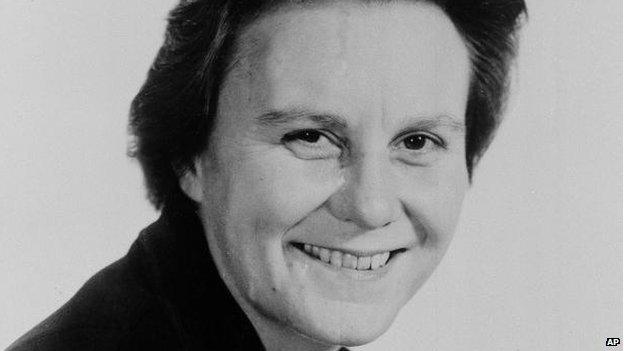Harper Lee novel reveals Finch as a 'bigot'
- Published

The book is being published in 26 countries on 14 July
Atticus Finch, the crusading lawyer of To Kill a Mockingbird, has emerged as "a bigot" in Harper Lee's eagerly awaited 1950s novel Go Set a Watchman.
Early reviews for Lee's novel, which was written before her masterpiece To Kill A Mockingbird, reveal Finch was originally penned as a segregationist.
"This story is of the toppling of idols," wrote Sam Sacks in the Wall Street Journal, external.
The New York Times said the revelation could "reshape Ms Lee's legacy".
"The depiction of Atticus in Watchman makes for disturbing reading, and for Mockingbird fans, it's especially disorienting," writes Michiko Kakutani, external in her review.
"How could the saintly Atticus - described early in the book in much the same terms as he is in 'Mockingbird' - suddenly emerge as a bigot?"
'Distressing'
Go Set a Watchman, which hits book shelves around the world on 14 July, has been the subject of intense scrutiny in the media and literary worlds since its existence came to public attention in February.
The book, essentially an earlier version of Mockingbird, follows 26-year-old Jean Louise (Mockingbird's Scout) as she returns to her Alabama hometown from New York to visit her ailing father.
Sacks called it "a distressing book, one that delivers a startling rebuttal to the shining idealism of To Kill a Mockingbird".
"For the millions who hold that novel dear, Go Set a Watchman will be a test of their tolerance and capacity for forgiveness.
"At the peak of her outrage, Jean Louise tells her father, 'You've cheated me in a way that's inexpressible'. I don't doubt that many who read this novel are going to feel the same way."

Harper Lee wrote Go Set a Watchman as a fledgling novelist in the 1950s
Publisher Harper Collins has issued a statement stressing that Lee "wanted to have the novel published exactly as it was written, without editorial intervention".
"The question of Atticus's racism is one of the most important and critical elements in this novel and it should be considered in the context of the book's broader moral themes," their statement said.
The character of Atticus Finch, the widower and smalltown lawyer who defends a black man wrongly accused of rape, became an iconic figure after the publication of To Kill A Mockingbird in 1960 - an image cemented by Gregory Peck's portrayal in the 1962 film adaptation.
'Time capsule'
In Go Set a Watchman, however, the 70-something Atticus asks his daughter Jean Louise: "Do you want Negroes by the carload in our schools and churches and theaters? Do you want them in our world?"
"This is the conflict of the novel, Jean Louise's struggle to come to some accommodation with a father who is not who she believed he was," writes David L Ulin in the Los Angeles Times, external.
"Certainly, it changes - as it must - our sense of Atticus, although that is complicated by the fact that this is not a follow-up, but instead an early version of the book."
Jocelyn McClurg, in USA Today, external, agrees: "Context is everything, and so it's important to know that Watchman was a first effort, set aside after Lee's editor urged her to turn instead to Scout Finch's Alabama childhood."
McClurg calls the book "a time capsule of a troubled time in the South".
"It's distressing to see the great, saintly Atticus diminished," she writes.
"If you think of Watchman as a young writer's laboratory, however, it provides valuable insight into the generous, complex mind of one of America's most important authors."
- Published10 July 2015

- Published10 July 2015

- Published10 July 2015

- Published3 February 2015
